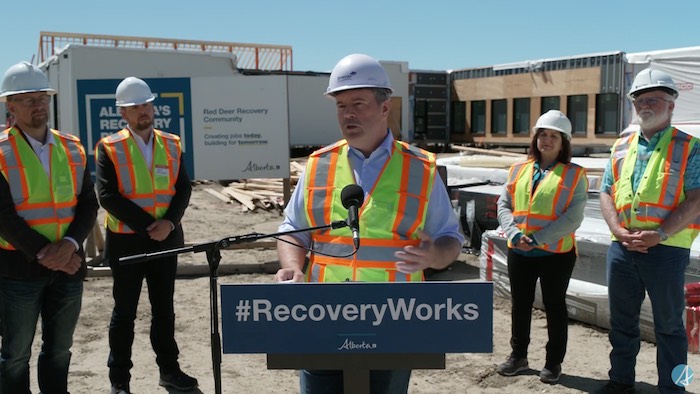Alberta
Red Deer recovery community slated for fall completion

Construction on the 75-bed recovery community project in Red Deer is on time and on budget and is expected to be completed this fall.
The Red Deer recovery community is a first-of-its-kind project in Alberta that will house a long-term addiction treatment program focused on helping people pursue recovery.
Currently 52 of 72 modular buildings are on site. The installation of mechanical and electrical systems as well as work on the building interiors are scheduled to get underway later this month. The final modular buildings will be arriving soon.
“Alberta’s government is making sure that every Albertan has the opportunity to pursue recovery from the devastating and destructive illness of addiction. I am pleased that this project is on time to start operations in the fall so that Albertans can begin their recovery as soon as possible.”
“Alberta Infrastructure plays a key role in delivering this essential project. Our goal is to have this facility up and running as soon as possible to bring more jobs and specialized care to the people of Red Deer.”
“Addiction and mental health challenges have taken a significant toll on central Alberta over the past decade. Increasing treatment capacity in Red Deer is long overdue. Alberta’s government is proud to make this investment to save lives, support recovery and bring hope to the community of Red Deer.”
“The Red Deer recovery community will be an important part of the recovery-oriented system of care that we are building in Red Deer to help people improve their lives. Our government is proud to invest in projects like this to build up our communities and bring more jobs to Albertans.”
“It is essential that our community have access to quality mental health care. This project will not only expand access to addictions treatment for those in need, but it will also bring jobs to our city and help boost our economic recovery.”
Recovery communities are a form of long-term residential treatment that focus on supporting people who are pursuing recovery. Recovery is seen as a gradual, ongoing process of behavioural change through clinical and peer interventions aimed at improving a person’s overall well-being.
Alberta’s government is helping Albertans access life-saving addiction and mental health-related prevention, intervention, treatment and recovery resources.

Quick facts
- This project is keeping Albertans working, supporting about 135 well-paid construction and construction-related jobs.
- Alberta Health is in the process of opening four recovery community projects.
- Red Deer (75-bed facility)
- Construction slated for fall completion.
- Lethbridge (50-bed facility)
- Groundbreaking took place in May 2022 and the project is on schedule to be completed in late 2022.
- Gunn (100-bed facility)
- The project is in the design stage. Construction and completion dates will be determined as the project progresses.
- Blood Tribe (75-bed facility)
- The project is in the planning phase.
- Red Deer (75-bed facility)
- Contact Alberta 211 for information about addiction treatments and supports available throughout the province.
- Albertans struggling with opioid use anywhere in the province can call the Virtual Opioid Dependency Program seven days a week at 1-844-383-7688 to access same-day treatment.
- Albertans using substances at home alone can download the DORS app to a smartphone free of charge from any app store or via DORSApp.ca. When using the app, Albertans will receive a call from the STARS emergency centre if they become unresponsive to a timer. If an overdose is suspected, STARS will immediately dispatch emergency medical services to the person’s location.
Alberta
Premier Smith: Canadians support agreement between Alberta and Ottawa and the major economic opportunities it could unlock for the benefit of all

From Energy Now
By Premier Danielle Smith
Get the Latest Canadian Focused Energy News Delivered to You! It’s FREE: Quick Sign-Up Here
If Canada wants to lead global energy security efforts, build out sovereign AI infrastructure, increase funding to social programs and national defence and expand trade to new markets, we must unleash the full potential of our vast natural resources and embrace our role as a global energy superpower.
The Alberta-Ottawa Energy agreement is the first step in accomplishing all of these critical objectives.
Recent polling shows that a majority of Canadians are supportive of this agreement and the major economic opportunities it could unlock for the benefit of all Canadians.
As a nation we must embrace two important realities: First, global demand for oil is increasing and second, Canada needs to generate more revenue to address its fiscal challenges.
Nations around the world — including Korea, Japan, India, Taiwan and China in Asia as well as various European nations — continue to ask for Canadian energy. We are perfectly positioned to meet those needs and lead global energy security efforts.
Our heavy oil is not only abundant, it’s responsibly developed, geopolitically stable and backed by decades of proven supply.
If we want to pay down our debt, increase funding to social programs and meet our NATO defence spending commitments, then we need to generate more revenue. And the best way to do so is to leverage our vast natural resources.
At today’s prices, Alberta’s proven oil and gas reserves represent trillions in value.
It’s not just a number; it’s a generational opportunity for Alberta and Canada to secure prosperity and invest in the future of our communities. But to unlock the full potential of this resource, we need the infrastructure to match our ambition.
There is one nation-building project that stands above all others in its ability to deliver economic benefits to Canada — a new bitumen pipeline to Asian markets.
The energy agreement signed on Nov. 27 includes a clear path to the construction of a one-million-plus barrel-per-day bitumen pipeline, with Indigenous co-ownership, that can ensure our province and country are no longer dependent on just one customer to buy our most valuable resource.
Indigenous co-ownership also provide millions in revenue to communities along the route of the project to the northwest coast, contributing toward long-lasting prosperity for their people.
The agreement also recognizes that we can increase oil and gas production while reducing our emissions.
The removal of the oil and gas emissions cap will allow our energy producers to grow and thrive again and the suspension of the federal net-zero power regulations in Alberta will open to doors to major AI data-centre investment.
It also means that Alberta will be a world leader in the development and implementation of emissions-reduction infrastructure — particularly in carbon capture utilization and storage.
The agreement will see Alberta work together with our federal partners and the Pathways companies to commence and complete the world’s largest carbon capture, utilization and storage infrastructure project.
This would make Alberta heavy oil the lowest intensity barrel on the market and displace millions of barrels of heavier-emitting fuels around the globe.
We’re sending a clear message to investors across the world: Alberta and Canada are leaders, not just in oil and gas, but in the innovation and technologies that are cutting per barrel emissions even as we ramp up production.
Where we are going — and where we intend to go with more frequency — is east, west, north and south, across oceans and around the globe. We have the energy other countries need, and will continue to need, for decades to come.
However, this agreement is just the first step in this journey. There is much hard work ahead of us. Trust must be built and earned in this partnership as we move through the next steps of this process.
But it’s very encouraging that Prime Minister Mark Carney has made it clear he is willing to work with Alberta’s government to accomplish our shared goal of making Canada an energy superpower.
That is something we have not seen from a Canadian prime minister in more than a decade.
Together, in good faith, Alberta and Ottawa have taken the first step towards making Canada a global energy superpower for benefit of all Canadians.
Danielle Smith is the Premier of Alberta
Alberta
A Memorandum of Understanding that no Canadian can understand

From the Fraser Institute
The federal and Alberta governments recently released their much-anticipated Memorandum of Understanding (MOU) outlining what it will take to build a pipeline from Alberta, through British Columbia, to tidewater to get more of our oil to markets beyond the United States.
This was great news, according to most in the media: “Ottawa-Alberta deal clears hurdles for West Coast pipeline,” was the top headline on the Globe and Mail’s website, “Carney inks new energy deal with Alberta, paving way to new pipeline” according to the National Post.
And the reaction from the political class? Well, former federal environment minister Steven Guilbeault resigned from Prime Minister Carney’s cabinet, perhaps positively indicating that this agreement might actually produce a new pipeline. Jason Kenney, a former Alberta premier and Harper government cabinet minister, congratulated Prime Minister Carney and Premier Smith on an “historic agreement.” Even Alberta NDP Leader Naheed Nenshi called the MOU “a positive step for our energy future.”
Finally, as Prime Minister Carney promised, Canada might build critical infrastructure “at a speed and scale not seen in generations.”
Given this seemingly great news, I eagerly read the six-page Memorandum of Understanding. Then I read it again and again. Each time, my enthusiasm and understanding diminished rapidly. By the fourth reading, the only objective conclusion I could reach was not that a pipeline would finally be built, but rather that only governments could write an MOU that no Canadian could understand.
The MOU is utterly incoherent. Go ahead, read it for yourself online. It’s only six pages. Here are a few examples.
The agreement states that, “Canada and Alberta agree that the approval, commencement and continued construction of the bitumen pipeline is a prerequisite to the Pathways project.” Then on the next line, “Canada and Alberta agree that the Pathways Project is also a prerequisite to the approval, commencement and continued construction of the bitumen pipeline.”
Two things, of course, cannot logically be prerequisites for each other.
But worry not, under the MOU, Alberta and Ottawa will appoint an “Implementation Committee” to deliver “outcomes” (this is from a federal government that just created the “Major Project Office” to get major projects approved and constructed) including “Determining the means by which Alberta can submit its pipeline application to the Major Projects Office on or before July 1, 2026.”
What does “Determining the means” even mean?
What’s worse is that under the MOU, the application for this pipeline project must be “ready to submit to the Major Projects Office on or before July 1, 2026.” Then it could be another two years (or until 2028) before Ottawa approves the pipeline project. But the MOU states the Pathways Project is to be built in stages, starting in 2027. And that takes us back to the circular reasoning of the prerequisites noted above.
Other conditions needed to move forward include:
The private sector must construct and finance the pipeline. Serious question: which private-sector firm would take this risk? And does the Alberta government plan to indemnify the company against these risks?
Indigenous Peoples must co-own the pipeline project.
Alberta must collaborate with B.C. to ensure British Columbians get a cut or “share substantial economic and financial benefits of the proposed pipeline” in MOU speak.
None of this, of course, addresses the major issue in our country—that is, investors lack clarity on timelines and certainty about project approvals. The Carney government established the Major Project Office to fast-track project approvals and provide greater certainty. Of the 11 project “winners” the federal government has already picked, most either already had approvals or are already at an advanced stage in the process. And one of the most important nation-building projects—a pipeline to get our oil to tidewater—hasn’t even been referred to the Major Project Office.
What message does all this send to the investment community? Have we made it easier to get projects approved? No. Have we made things clearer? No. Business investment in Canada has fallen off a cliff and is down 25 per cent per worker since 2014. We’ve seen a massive outflow of capital from the country, more than $388 billion since 2014.
To change this, Canada needs clear rules and certain timelines for project approvals. Not an opaque Memorandum of Understanding.
-

 Censorship Industrial Complex1 day ago
Censorship Industrial Complex1 day agoCanadian bishops condemn Liberal ‘hate speech’ proposal that could criminalize quoting Scripture
-

 Daily Caller23 hours ago
Daily Caller23 hours agoTrump Orders Review Of Why U.S. Childhood Vaccination Schedule Has More Shots Than Peer Countries
-

 Alberta15 hours ago
Alberta15 hours agoA Memorandum of Understanding that no Canadian can understand
-

 Economy2 days ago
Economy2 days agoWhat the Data Shows About the New Canada-Alberta Pipeline Opportunity
-

 illegal immigration2 days ago
illegal immigration2 days agoWhile Trump has southern border secure, hundreds of thousands of illegal immigrants still flooding in from Canada
-

 Energy24 hours ago
Energy24 hours agoSenate votes to reopen Alaska Coastal Plain to energy leasing
-

 Aristotle Foundation15 hours ago
Aristotle Foundation15 hours agoThe extreme ideology behind B.C.’s radical reconciliation agenda
-

 Energy2 days ago
Energy2 days agoThe Trickster Politics of the Tanker Ban are Hiding a Much Bigger Reckoning for B.C.










